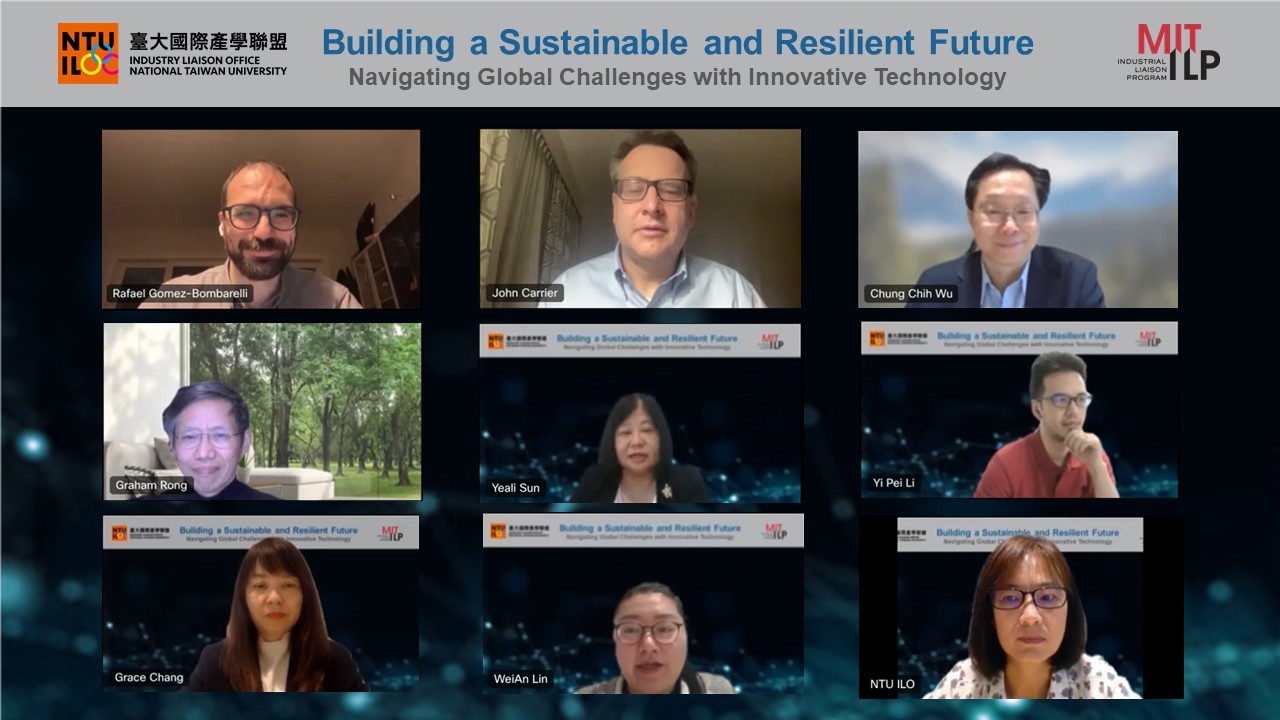National Taiwan University and the Massachusetts Institute of Technology teamed up on April 20 to host an online workshop “Building a Sustainable and Resilient Future: Navigating Global Challenges with Innovative Technology". The workshop brought together experts from both institutions to discuss how the latest technology can be leveraged to tackle the global challenges of sustainability and resilience during a time of increasingly scarce resources and rapid environmental changes. “The world is facing unprecedented challenges,” said Distinguished Professor Chung-Chih Wu, VP of the Office of Research and Development, and Director of Industry Liaison Office, NTU. “It is becoming increasingly clear that it requires collaborative efforts to find solutions. Technology, innovation, and entrepreneurship have the potential to play a significant role in addressing these complex problems and creating a sustainable and resilient future for all.”

Photo 1: Group photo of workshop speakers and guests
Assistant Professor Rafael Gomez-Bombarelli from the Department of Material Science and Engineering, MIT, kicked off the event by discussing AI-driven design of materials for energy and sustainability. Dr. Gomez-Bombarelli explained how computational techniques, such as atomistic simulation and machine learning, can be used to rapidly invent new materials and navigate this enormous space. He also presented the current progress of his research group in enabling end-to-end materials design for multiple materials classes and applications. Next, Dr. John Carrier, Senior Lecture in System Dynamics at the MIT Sloan School of Management talked about developing a resilient organization for sustainability. He emphasized the importance of an organization's ability to react, respond, and recover from short-term shocks, and how the development of new resilient capabilities can lead to a more sustainable future. Dr. Carrier also discussed how hidden factories in an organization may be exploited to simultaneously reduce risk, increase profitability and resilience, and improve organizational culture.
In the second half of the workshop, Professor Yeali Sun from the Department of Information Management, NTU, presented on measuring the quality of Cyber Threat Intelligence (CTI) documents through malware attack pattern matching. Dr. Sun discussed how the increasing prevalence of cyber threats poses a significant challenge for organizations, and how the quality of CTI is crucial in mitigating these threats. She then shared her research on finding automated and reliable methods for evaluating the quality of CTI documents. Next, Assistant Professor Yi-Pei Li from the Department of Chemical Engineering, NTU gave a talk focusing on deep learning in chemical design and property prediction. He discussed how recent advances in deep neural networks have led to the development of models with remarkable accuracy for chemical design and property predictions, and how these models can be applied in various fields, including retrosynthesis, drug discovery, and material developments. He also discussed how the accuracy and applicability of these models depend on the quality and quantity of available data, and how deliberate design of deep neural network architecture and active and transfer learning strategies can improve model generalizability.
The online workshop brought together a diverse group of attendees, including researchers, academics, students, and professionals. It provided a platform for knowledge exchange and collaboration. The success of this event opened up a dialogue between NTU and MIT on solving global challenges and also laid the foundation for possible future cooperation.